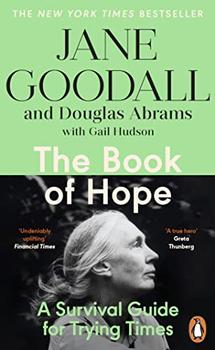Summary | Excerpt | Reviews | Beyond the Book | Readalikes | Genres & Themes | Author Bio

A Survival Guide for Trying Times (Global Icons Series)
by Jane Goodall, Douglas Abrams
It sounded like action and agency were important for generating hope, but that hope could survive even in a prison cell. A black cat with a white chest strolled out of the house and onto the balcony and jumped in Jane's lap, curling up comfortably, his paws tucked under him.
"I'm wondering if animals have hope."
Jane smiled. "Well, when Bugs here," she said, petting the cat, "was sitting inside all that time, I suspect he was 'hoping' that eventually he would be let out. When he wants food, he gives plaintive meows and rubs against my legs with arched back and waving tail, as this usually produces the desired effect. I'm sure when he does that he's hoping he will be fed. Think of your dog waiting in the window for you to come home. That's clearly some form of hope. Chimps will often throw a tantrum when they don't get what they want. That is some form of frustrated hope."
It seemed like hope was not uniquely human, but I knew we'd return to what made hope unique in the human mind. For now, I wanted to understand how hope was different from another term with which it is often confused. "Many of the world's religious traditions talk about hope in the same breath as faith," I said. "Are hope and faith the same?"
"Hope and faith are very different, aren't they," Jane said, more as a statement than a question. "Faith is when you actually believe there is an intellectual power behind the universe, which can be translated into God or Allah or something like that. You believe in God, the Creator. You believe in life after death or some other doctrine. That's faith. We can believe that these things are true, but we can't know. But we can know the direction we want to go and we can hope that it is the right direction. Hope is more humble than faith, since no one can know the future."
"You were saying that hope requires us to work hard to make what we want to happen actually happen."
"Well, in certain contexts it is essential. Take this dire environmental nightmare we are living in today. We certainly hope that it is not too late to turn things around—but we know that this change will not happen unless we take action."
"So by being active, you become more hopeful?"
"Well, you have it both ways. You won't be active unless you hope that your action is going to do some good. So you need hope to get you going, but then by taking action, you generate more hope. It's a circular thing."
"So what actually is hope—an emotion?"
"No, it's not an emotion."
"So what is it?"
"It's an aspect of our survival."
"Is it a survival skill?"
"It's not a skill. It's something more innate, more profound. It's almost a gift. Come on, think of another word."
"'Tool'? 'Resource'? 'Power'?"
"'Power' would do. 'Power'—'tool.' Something like that. Not a power tool!"
I laughed at Jane's joke. "Not a drill?"
"No, not an electric drill," Jane said, laughing, too.
"A survival mechanism…?"
"Better, but less mechanical. A survival…" Jane paused, trying to come up with the right word.
"Impulse? Instinct?" I offered.
"Actually, it's a survival trait," she finally concluded. "That's what it is. It is a human survival trait and without it we perish."
If it was a survival trait, I wondered why some people had more of it than others, if it could be developed during particularly stressful times, and whether she had ever lost it.
Have You Ever Lost Hope?
Jane has a rare blend of qualities—a scientist's unflinching willingness to face the hard facts and a seeker's desire to understand the most profound questions of human life.
"As a scientist, you—" I began.
"I consider myself a naturalist," she corrected.
"What's the difference?" I had always assumed a naturalist was simply a scientist who went out into the field.
Excerpted from The Book of Hope by Jane Goodall and Douglas Abrams. Copyright © 2021 by Jane Goodall and Douglas Abrams. Excerpted by permission of Celadon. All rights reserved. No part of this excerpt may be reproduced or reprinted without permission in writing from the publisher.
Your guide toexceptional books
BookBrowse seeks out and recommends the best in contemporary fiction and nonfiction—books that not only engage and entertain but also deepen our understanding of ourselves and the world around us.